Class Struggle, No. 22
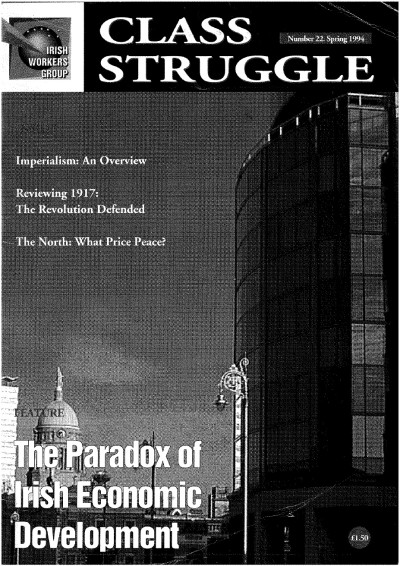
| Date: | 1994 |
|---|---|
| Organisation: | Irish Workers' Group [1976] |
| Publication: | Class Struggle |
| Issue: | Volume 22, Spring 1994 |
Contributors:
Info | Bernadette Barrington, Maureen Gallagher, Andy Johnston, Edward McWilliams |
| Type: | Publication Issue |
| View: | View Document |
| Discuss: | Comments on this document |
| Subjects: |
Please note: The Irish Left Archive is provided as a non-commercial historical resource, open to all, and has reproduced this document as an accessible digital reference. Copyright remains with its original authors. If used on other sites, we would appreciate a link back and reference to The Irish Left Archive, in addition to the original creators. For re-publication, commercial, or other uses, please contact the original owners. If documents provided to The Irish Left Archive have been created for or added to other online archives, please inform us so sources can be credited.
Commentary From The Cedar Lounge Revolution
12th May 2014
Many thanks to the person who scanned and donated this document to the Archive. It is very much appreciated.
Class Struggle from the Irish Workers Group was published in 1994. It is a long, very well produced, document which at 58 pages covers a significant range of topics.
The Irish Workers Group was the result of a split and expulsions from the Socialist Workers Movement in 1975 due to differences with the latter organisation primarily over its stance on the North and Women. The IWG believed in a strong supportive approach to republicans within the Provisional IRA while not calling for support for Provisional Sinn Féin. It also sought the establishment of an anti-imperialist united front. It also sought to place the issue of women to placed as a central issue for the Irish working class, particularly in relation to contraception and abortion on demand.
You can find a more detailed history here and links to other editions of Class Struggle from the 1970s and 1980s here .
Later the IWG became Workers Power.
This document contains articles on “Imperialism: An Overview”, “The Paradox of Irish Economic Development”, “Reviewing 1917: The Revolution Defended, a ‘Polemic’ on “The Politics of Anarchism” and a ‘Statement’ on “The North: What Price Peace” which was issued by the International Secretariat of the League for a Revolutionary Communist International (LRCI).
There is also a review of “The Irish Economy: Results and Prospects”.
With such scope it is beyond the range of this post to engage with each of the above, suffice it to say that each is well worth reading and considering on their own terms. However, it is useful to address briefly some of the editorial which gives a sense of the document as a whole.
The political and social developments of two decades past in Ireland are at this moment crystallising on two important fronts. A historic defeat is being prepared by the republican movement, ending more than two decades of open revolt by Six County nationalists against their oppressor sectarian state. And in the Republic the grinding down and atomisation of the organised working class movement, over the past two decades, at the hands of a bloated trade union bureaucracy, is taking shape in major reversals of historic gains.
It looks at the then improving economic conditions and suggests that there has been ‘deepening division’ within the organised working class with three distinct strata ‘a labour aristocracy whose salaries and wages have been very effectively defended against inflation and in several areas significantly increased; a growing mass of workers on low wages or additionally with insecure contracts; and a vast mass of unemployed and their dependents.
It continues:
Most dramatic and dangerous of all these developments has been the growth of mass unemployment – in periods of recession and growth – a kind that seems increasingly permanent.
It also points to an ‘exhaustion of the Anti-Imperialist Movement’ by which it means Sinn Féín and the IRA. And it argues that ‘From the mid 1980’s SF implicitly recognised the limitations of its struggle with the Six Counties. It turned to the south hoping to overcome its isolation by building a mass nationalist movement along the lines of the PLO or ANC. This strategy has failed miserably – another reason for pursuance by the mid 1980’s of a ‘peace campaign’.
And it suggests that:
SF has seen its economic programme made irrelevant by events. Its programme for national development has been turned into a historical curio by the nature of the world economic development and the fall of Stalinism. The combined results of this failure of perspective have pushed the petit bourgeois nationalist SF closers and closer towards the bourgeois constitutional nationalists of the SDLP.
It proposes that:
Against the background of these developments the record of the Irish left has been one of irrelevance. A major part of this irrelevance lies with a historic failure of the left to seriously examine the irish social formation. For too long impressionism and an inherited tradition of republican nationalist sentiments concerning the nature of Irish society and its domination by British imperialism has been the model.
And intriguingly it argues that the only efforts to ‘re-examine critically the nature of the Irish economy’ have been conducted by the SWM and the IWG.
In light of the above it concludes that:
The principle underlining the work we have undertaken in this journal is that no real understanding of the dynamic of the class struggle is possible, and thus no programmatic basis for intervention in that struggle can be developed, without a scientific analysis of the nature of the dynamics of capital accumulation in Irish society.
This analysis falls into two parts. Firstly a summary of the Marxist theory of imperialism and an outline of the key transformations in global political economy since the war, which have posed problems for classical Marxist theorists. The second and major article, in what we hope will be the first in a series of articles devoted to Irish political economy, takes up the challenge of analysing the origins, role and nature of productive capital in the Republic.
It provides an useful addition to the Archive from the IWG.
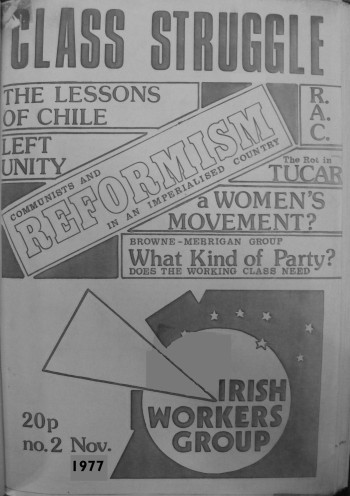
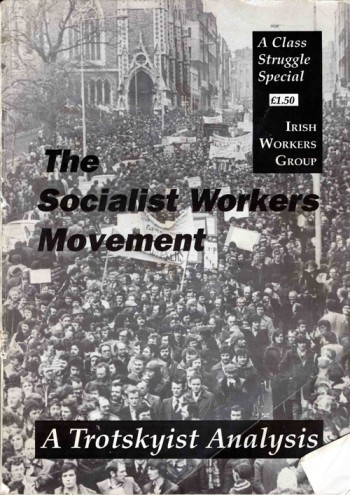
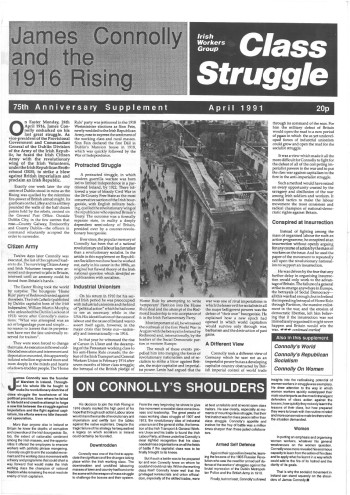
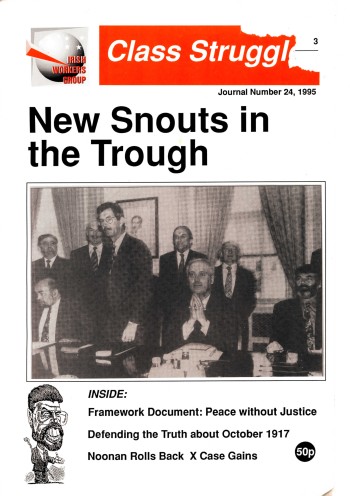
Comments
You can also join the discussion on The Cedar Lounge Revolution
No Comments yet.
Add a Comment
Comments can be formatted in Markdown format . Use the toolbar to apply the correct syntax to your comment. The basic formats are:
**Bold text**
Bold text
_Italic text_
Italic text
[A link](http://www.example.com)
A link